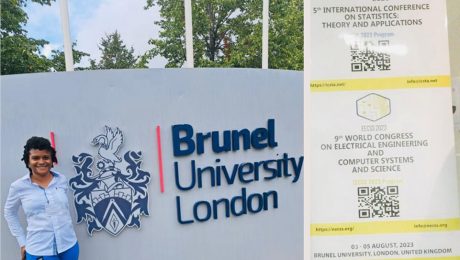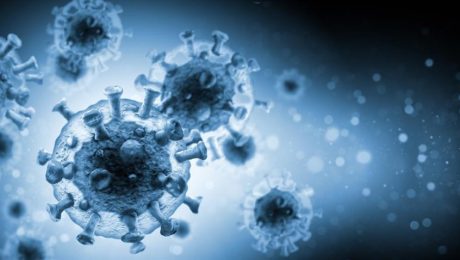
Jacqueline Materu, a fellow in the Mwanza Fogarty Research Training Program, won the Best Paper Award at the 5th International Conference on Statistics: Theory and Applications (ICSTA 2023), which took place at Brunel University, London. This award was for the presentation of her paper titled “Comparison of survival analysis approaches to modelling age at first sex among youth in Kisesa, Tanzania.”
The ICSTA Best Paper Award is a competitive prize given to authors of the papers that rank highest in a peer review process by the esteemed session chairs of the ICSTA. As a Best Paper Award winner, Jacqueline received a certificate and a 25% discount toward registration for the 2024 ICSTA conference series. Moreover, Jacqueline can submit her modified presented paper to a related journal published by Avestia Publishing for free publication.The Mwanza Fogarty Research Training Program supported Jacqueline’s attendance at the 5th ICSTA. Read more about Jacqueline’s work and the Mwanza Fogarty Research Training Program here.

Joint Statement by the Heads of the World Bank Group, International Monetary Fund, World Health Organization, and World Trade Organization
The Heads of the World Bank Group, International Monetary Fund, World Health Organization, and World Trade Organization today convened for the first meeting of the Task Force on COVID-19 Vaccines, Therapeutics and Diagnostics for Developing Countries. They issued the following joint statement:
“As many countries are struggling with new variants and a third wave of COVID-19 infections, accelerating access to vaccines becomes even more critical to ending the pandemic everywhere and achieving broad-based growth. We are deeply concerned about the limited vaccines, therapeutics, diagnostics, and support for deliveries available to developing countries. Urgent action is needed now to arrest the rising human toll due to the pandemic, and to halt further divergence in the economic recovery between advanced economies and the rest.
We have formed a Task Force, as a “war room” to help track, coordinate and advance delivery of COVID-19 health tools to developing countries and to mobilize relevant stakeholders and national leaders to remove critical roadblocks—in support of the priorities set out by World Bank Group, IMF, WHO, and WTO including in the joint statements of June 1 and June 3, and in the IMF staff’s $50 billion proposal.
At today’s first meeting, we discussed the urgency of increasing supplies of vaccines, therapeutics, and diagnostics for developing countries. We also looked at practical and effective ways to track, coordinate and advance delivery of COVID-19 vaccines to developing countries.
As an urgent first step, we are calling on G20 countries to (1) embrace the target of at least 40 percent in every country by end-2021, and at least 60 percent by the first half of 2022, (2) share more vaccine doses now, including by ensuring at least 1 billion doses are shared with developing countries in 2021 starting immediately, (3) provide financing, including grants and concessional financing, to close the residual gaps, including for the ACT-Accelerator, and (4) remove all barriers to export of inputs and finished vaccines, and other barriers to supply chain operations.
In addition, to enhance transparency we agreed to compile data on dose requests (by type and quantity), contracts, deliveries (including through donations), and deployments of COVID-19 vaccines to low and middle-income countries—and make it available as part of a shared country-level dashboard. We also agreed to take steps to address hesitancy, and to coordinate efforts to address gaps in readiness, so countries are positioned to receive, deploy and administer vaccines.”
Gerry Mshana, Zaina Mchome, Diana Aloyce, Esther Peter, Saidi Kapiga and Heidi Stöckl.
PMID: 33902620
The Vaginal Microbiota Among Adolescent Girls in Tanzania Around the Time of Sexual Debut
Francis SC, Crucitti T, Smekens T, Hansen CH, Andreasen A, Jespers V, Hardy L, Irani J, Changalucha J, Baisley K, Hayes R, Watson-Jones D, Buvé A.
Front Cell Infect Microbiol. 2020 Jun 25;10:305.
PMID: 32670894.
PMCID: PMC7330010.
DOI:10.3389/fcimb.2020.00305.
We have new exciting news about a low cost drug which has been found to be effective in treating severe COVID-19 cases. See attached PDF file.
[easy_media_download url=”https://mitu.or.tz/wp-content/uploads/2020/06/Recovery-trial-effect-of-dexamethasone-on-severe-covid-19-disease.pdf” text=”Download PDF ” force_dl=”1″ class=”btn-warning”]
Chronic diarrhoea and helminthic infections, especially soil transmitted helminths (STH), are frequent infections in childhood, and are strongly associated with malnutrition, and poor child and cognitive development. Common STH infections – ascariasis and trichuriasis – are picked up when people ingest Ascaris lumbricoides and Trichuris trichiura eggs after they have matured in the environment by eating raw, unwashed vegetables or by not washing their hands after handling contaminated soil.
The burden of STH is very high in Kagera region in northwestern (NW) Tanzania, with more than 50% of school children infected with at least one worm in most schools in this region. As part of the national deworming programme, the government provides drugs once every year to all primary school pupils in Kagera and other regions where this is a problem. Whilst deworming campaigns offer a cost-effective method for the reduction of the STH burden, children become quickly reinfected. An integrated approach that combines sustainable hygiene behaviour change with deworming could prove a more effective way to control STH infections.
To address this problem, MITU is conducting a Mikono Safi(which means clean hands in Kiswahili) trial to assess the effectiveness of a behaviour intervention, including promotion of handwashing with soap (HWWS), among school-aged children in the Kagera region of NW Tanzania in reducing both the prevalence and intensity of Ascaris lumbricoides and Trichuris trichiura infections. This is part of the DFID funded consortium “Sanitation and Hygiene Applied Research for Equity” (SHARE) (www.shareresearch.org).
 The trial is implemented in two main stages. The first stage was conducted between September 2016 and April 2017. During this stage, formative research was conducted in three schools in Bukoba Municipality to develop and pilot a comprehensive hand hygiene intervention for use in schools and communities. Findings from this stage were used to finalise the design of the intervention package and other details of the trial.
The trial is implemented in two main stages. The first stage was conducted between September 2016 and April 2017. During this stage, formative research was conducted in three schools in Bukoba Municipality to develop and pilot a comprehensive hand hygiene intervention for use in schools and communities. Findings from this stage were used to finalise the design of the intervention package and other details of the trial.
The second stage of the trial started in August 2017 with the selection of 16 schools to be included in the trial from Bukoba municipality, Bukoba rural district and Muleba district. The schools were randomised to the intervention (8) or control (8) arm during a meeting attended by head teachers and other officials. The implementation of the intervention started in November 2017. The intervention package includes installation of handwashing facilities and other environmental modifications; engagement with parents to promote the intervention at home; teachers training and delivery of classroom sessions; educational materials to promote handwashing at school; and enhanced organisational support at schools.
The primary outcome of interest will be the prevalence of infection with ascaris and trichuris following deworming in both the intervention and control schools. Secondary outcomes will include: self-reported hand-washing behaviour (both at home and in schools), the prevalence of worm eggs retrieved from hands in a subgroup of pupils, and the prevalence of hookworm infection.
For more information about this trial and SHARE Consortium activities in Tanzania please contact Mr Amani Beda at amani.beda@mitu.or.tz or Tel # +255 282 500019.






